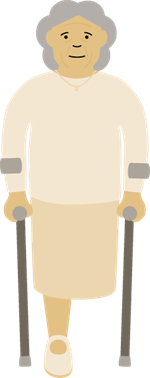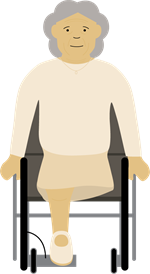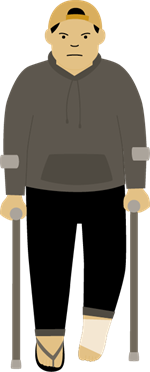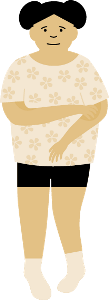Past activities
At the 2017 election, we called for health equity from the New Zealand Government for all.
-
Healthy housing
-
Good work
-
Whānau wellbeing
-
Tab menu 4
Make healthy housing the norm
In 2017, more than 42,000 New Zealanders lived in precarious and insecure housing.
Housing in Aotearoa New Zealand: Key facts
- Living in a crowded house or car will worsen existing health conditions for adults and children, such as asthma, depression and anxiety.
- People living in cars during winter are at risk of developing serious respiratory infections, such as bronchiolitis and pneumonia.
- The temperature in almost 30% of dwellings is below World Health Organisation recommendations of 18 to 21ºC.
- The stress of financial hardship and homelessness is detrimental to mental health and wellbeing for all whānau members.
- Children have nowhere to do homework or play, and many children living in cars will have gaps in their schooling. This puts them at risk of falling behind their peers, resulting in poorer education outcomes in the longer term.
 Shirley is a 70 year old female who was admitted to hospital for an acute chest infection. She was admitted to hospital the previous winter with influenza, though she stayed in hospital some weeks due to infected pressure sores. Previously, Shirley’s foot was amputated due to poorly controlled diabetes. She means she's largely bedridden and pressure sores are a frequent concern. Shirley told clinical staff she often stayed in bed simply to keep warm.
Shirley is a 70 year old female who was admitted to hospital for an acute chest infection. She was admitted to hospital the previous winter with influenza, though she stayed in hospital some weeks due to infected pressure sores. Previously, Shirley’s foot was amputated due to poorly controlled diabetes. She means she's largely bedridden and pressure sores are a frequent concern. Shirley told clinical staff she often stayed in bed simply to keep warm.
"This house is so cold in winter. Sometimes it feels like the sun doesn’t even come through the windows in some rooms, they are so dark and damp. I don’t remember houses being so cold but then maybe it was because I was younger, and healthier.
"Now that I am getting older, it’s easier to stay in bed all day and at least keep a bit warmer. Last winter, I had to go to hospital for the ‘flu, and they found that some pressure sores had become infected, which meant I had to be in hospital for longer. I missed my grandchildren."
— Shirley, 2017
Government action is required
At the 2017 election, we called on the New Zealand Government to address 3 key healthy housing issues.
Urgently address homelessness and housing insecurity
The Aotearoa New Zealand government needs to:
- increase available public housing stock for low income New Zealanders
- prioritise housing assistance for people and families living in cars, garages, outbuildings, tents, boarding houses, caravans, camping grounds and sleeping rough on the streets
- increase the availability of affordable homes
Introduce regulation to mandate a Warrant of Fitness and Health for residential dwellings
Landlords and property owners have to address the:
- presence of dampness and mould
- availability of fuel-efficient heating options
- provision of smoke alarms
- presence of security locks and window stays
Focus on fuel poverty now
The Aotearoa New Zealand government must:
- provide targeted assistance with electricity and/or gas utilities for low-income families with children under 18 hospitalised for a respiratory illness.
- improve the Warm Up New Zealand Initiative (PDF) by:
- working with local authorities to improve access to insulation and energy-efficient, affordable heating options
- reviewing current criteria for assessment for funded insulation
- extending it to all of Aotearoa NZ, with a focus on high deprivation areas
Member check-in
In a 2019 survey of RACP Aotearoa NZ members, we asked them to rank government initiatives from making the most difference to people’s health to making the least difference to people’s health.
The top 3 policies were the:
- introduction of Healthy Homes Standards for insulation, ventilation, moisture and dampness for rental properties
- Winter Energy Payment — universal payment to all beneficiaries
- changes to the Residential Tenancies Act, including the Prohibition of Letting Fees
"Acknowledgement of housing’s impact on health is vital."
"Houses are so poorly built and maintained. They must be warm and healthy, and more of them."
 Shirley, now 72, lives alone in council-owned pensioner housing after living in emergency housing. Although her new home is accessible for her wheelchair, she often gets lonely.
Shirley, now 72, lives alone in council-owned pensioner housing after living in emergency housing. Although her new home is accessible for her wheelchair, she often gets lonely.
Age Concern finds around 1 in 4 older people experience loneliness and social isolation.
"We had 42 days to move out. Then the house was sold. We had nowhere to go and our whānau were split up. I spent over 6 months living in a motel."
— Shirley, 2019
Progress
Since 2017 to 2019, there was some progress but a 12,000 plus waitlist suggests there’s room for improvement.
- Progress to improve the standard of rental housing has begun but standards will only be effective if they’re enforced.
- The need for public housing is dire and evidenced by the increasing waitlist. Dedicated public housing must be built as an urgent priority.
- Early results from novel initiatives to address homelessness are showing progress and these should be scaled up.
Make good work the norm
In 2017, over 200,000 households reported that their income was not enough to meet every day needs.
Work in Aotearoa New Zealand: Key facts
- Paying a living wage has health benefits for dependent children, including physical and mental health and wellbeing.
- A job paying a living wage boosts living standards and provides a way out of poverty.
- 90,000 young people are not in education, employment or training.
- Long-term unemployment risks negative health outcomes and greater mortality.
- 10% of the labour force are not in work due to sickness, injury or disability.
- Workplaces which promote the health and wellbeing of workers are more productive.
‘Good work’ improves general health and wellbeing and reduces psychological distress.
 Matthew is 15 and not in employment, education or training. He has been admitted to the paediatrics ward after falling from a building while drunk. He lost contact with his drug and alcohol counsellor when the youth clinic closed.
Matthew is 15 and not in employment, education or training. He has been admitted to the paediatrics ward after falling from a building while drunk. He lost contact with his drug and alcohol counsellor when the youth clinic closed.
"I got stood down at school for fighting and having drugs at school a couple of times and mum was pretty mad. I hated school anyway, so when I had to go back I started wagging a bit more and then I just stopped going.
"Mum stopped asking about school — she’s asleep or working late shift so we don’t talk much. Sometimes I do some labouring if my mate’s uncle can get us a job, but that hasn’t happened for a while."
— Matthew, 2017
Government action is required
At the 2017 election, we called on the New Zealand Government to address 3 key good work issues.
Promote the Living Wage
Promote the Living Wage to employers, businesses and organisations as an evidence-informed initiative to support the health and wellness of employees and their whānau.
Recognise the workplace as a venue for influencing healthcare systems
- Encourage employers to introduce:
- wellness programs which support health and wellbeing, including mental health
- access to services such as Employee Assistance Programs (EAPs)
- health and safety officers for all workplaces (regardless of size) and ensure that these officers receive training
- cultural safety policies which support diversity in the workplace
- leave for survivors of domestic violence
- Develop policy to increase health literacy.
Increase support for people not in work
Support people who are not in work or training to access work and training opportunities and find appropriate work.
What you told us
In a 2019 survey of RACP Aotearoa NZ members, they ranked their top 3 policies they feel will make a difference to people’s health.
- Increasing the minimum wage
- Supportive return/entry to work programs — Te Ara Mahi and He Poutama Rangatahi
- Increases to Paid Parental Leave
"Support the living wage, introduce legislation and tax breaks for companies who offer living wage."
"The pay has to make it worthwhile for people to go to work."
 Matthew is now part of He Poutama Rangatahi, an initiative to connect NEETs (Not in Employment, Education or Training) with vocational education and employment opportunities.
Matthew is now part of He Poutama Rangatahi, an initiative to connect NEETs (Not in Employment, Education or Training) with vocational education and employment opportunities.
Through the scheme, Matthew is hoping to become an apprentice in construction or roading.
"I like the program [He Poutama Rangatahi]. It’s going to help me with my future.
"I liked the idea of construction, roading, engineering. I wanted to be working outside."
— Matthew, 2019
More work needed
Income inadequacy remains for many whānau:
- While the Minimum Hourly Wage has risen to $17.70, it’s well below the 2019 Living Wage of $21.15.
- The Whakamana Tangata Report found income inadequacy was entrenched for many people receiving government benefits.
- There were few programs to support entry into or return-to-work for people with disabilities or with common mental health conditions.
Make whānau wellbeing the norm
The health and wellbeing of children and young people is not prioritised in policy development in Aotearoa New Zealand.
Whānau wellbeing in New Zealand: Key facts
- Inequities are persistent, systemic and avoidable so they’re inherently unjust.
- Children in the most deprived areas are 3 times more likely to be hospitalised for potentially avoidable illnesses than children in the least deprived areas.
- Communities with higher levels of deprivation are more likely to have:
- worse access to healthy foods
- greater access to high-interest money lenders
- greater access and availability of off-license alcohol outlets
- Sole parent households with young children are more likely to experience mental health issues.
- Over 150,000 New Zealanders will access mental health services annually.
- Children and young people who experience poverty are 2 to 3 times more likely to develop mental health conditions.
 Amy is 9 years old and has been hospitalised twice before for infected atopic dermatitis (eczema). This time she has been admitted to the paediatrics ward for a suspected Staphylococcus aureusinfection (cellulitis), which has spread to her existing dermatitis. She has received flucloxacillin intravenously.
Amy is 9 years old and has been hospitalised twice before for infected atopic dermatitis (eczema). This time she has been admitted to the paediatrics ward for a suspected Staphylococcus aureusinfection (cellulitis), which has spread to her existing dermatitis. She has received flucloxacillin intravenously.
Amy is overweight for her age and height. She has symptoms of obstructive sleep apnoea, which causes her to snore and breathe heavily during sleep, disturbing her siblings. She has trouble concentrating at school as she is tired from poor quality sleep, as well as itchy from her eczema. Amy is a frequent target for teasing and bullying from other children due to her dermatitis.
Amy lives with her mother, her siblings, aunt, uncle, cousins and grandmother in a house rented by her aunt and uncle. She shares a mattress in the living room with her sisters, with the children sharing blankets, linen and towels — increasing her susceptibility to infections. There is no computer or books available to assist Amy or other children in the whānau with their learning and homework, and there is no quiet place to study.
"It’s hard to sleep in hospital because the eczema is all over my back and my knees — there’s no way to sleep so it doesn’t hurt. It’s on my face too, and in the morning there are flakes of skin on my pillow. The eczema is feels hot and puffy and yellow-green pus oozes out of the sores on my arms.
"The doctor said that baths are really good for the itching but we don’t have a bath in this house and the medicine was too expensive. I share my towel with Mikayla and she sometimes leaves it wet on the floor, so it is hard to dry myself. Mikayla’s only 5 though.
"Kids at school make fun of me when I have eczema on my face. They call me names and it makes me cry. I hate going to school."
— Amy, 2017
Government action is required
At the 2017 election, we called on the New Zealand Government to address 3 key whānau wellbeing issues.
Increase support for communities to improve whānau health and wellbeing
Support local authorities and communities work to reduce:
- ‘food swamps’ — environments where unhealthy foods and beverages are readily available and heavily advertised
- alcohol off-licenses
- gambling outlets
- non-bank lending outlets
Expand support for mental health in primary care
- Address the systemic barriers exacerbating the physical health disparities and premature mortality experienced by people with mental health conditions and addiction.
- Encourage health professionals to discuss mental health and mental wellbeing with patients as part of consultations.
- Consider mental health and wellbeing as equal to physical health and wellbeing.
Take a child-centred approach to all legislation, policy and regulation
Apply a child health equity lens to the development, implementation, monitoring and assessment of legislation, policy and regulation, particularly where children and young people are indirectly affected.
What our members say
In a 2019 survey, RACP Aotearoa NZ members ranked their top 3 policies that they feel will make a difference to people’s health.
- Allow more people to be eligible for low-cost GP visits.
- Child Poverty Reduction Act, whereby the government will report on progress to reduce child poverty in Aotearoa NZ.
- Families Package — extra support for whānau during baby’s early years.
"Make GP visits free for all — or if you can afford, make it a donation."
"More money directly to the people in need will significantly and swiftly increase people’s wellbeing."
 The Office of the Children’s Commissioner reports that parents or caregivers not having enough money for basic costs like housing, clothes and food, makes children and young people feel anxious and worried.
The Office of the Children’s Commissioner reports that parents or caregivers not having enough money for basic costs like housing, clothes and food, makes children and young people feel anxious and worried.
"I know Mum doesn’t have enough money and it makes me stressed. We had to buy a new school uniform for me because I've gotten bigger and it costs a lot of money.
"There's also my medication for my eczema. I feel bad that my Mum worries so much all the time."
— Amy, 2019
Whānau are still struggling
Many whānau battle to provide the basics and the non-government sector is under pressure to fill the gap.
- Food insecurity is a reality for around 500,000 New Zealanders.
- Lower-cost GP visits are an important start but more work to address other barriers like transport and availability of appointments is needed.
- Low-income whānau could be better supported through entitlements like the Winter Energy Payment.